#plot in sarde
Explore tagged Tumblr posts
Text

Land for Sale in Third Mumbai: KCS New Town Development
Explore prime land and plots in the emerging Third Mumbai, known as KCS New Town. This extensive development project by the MMRDA encompasses 124 villages, creating a modern urban landscape around the Navi Mumbai International Airport. Here’s a closer look at some key areas within this exciting development:
Chirle: A strategically located hub that is rapidly transforming, Chirle offers excellent opportunities for residential and commercial development, leveraging its proximity to the airport.
Vindhane: This picturesque area is ideal for creating residential complexes and green spaces, making it a sought-after location for families and investors alike.
Ranjanpada: With its enhanced connectivity, Ranjanpada is an attractive investment destination for infrastructure and housing projects, set to benefit from the ongoing development initiatives.
Chirner: Positioned near the airport, Chirner presents ample land for industrial and logistics facilities, capitalizing on its strategic location for business growth.
Jui: A vibrant locality that offers mixed-use development opportunities, Jui is perfect for those looking to invest in both residential and commercial properties.
Pirkone: Emerging as a residential hotspot, Pirkone is appealing to families and individuals seeking a suburban lifestyle with access to urban amenities.
Vasheni: This area is gaining attention for real estate development, making it a promising investment option for those looking to capitalize on urban expansion.
Sarde: Transitioning from its agricultural roots, Sarde is opening up to urban development, presenting opportunities for investors looking to develop residential and commercial projects.
Punade: Ideal for affordable housing, Punade caters to the growing demand for budget-friendly living spaces, making it a strategic investment choice.
KCS New Town is poised to create a well-planned urban ecosystem that prioritizes sustainability and connectivity. Investing in land in this developing area not only promises future growth but also positions you at the forefront of Mumbai’s expansion. Don’t miss the opportunity to be part of this transformative project in Third Mumbai! Crescera Group
#chirle#uran#thirdmumbai#KSC New Town#Land in Uran#land in chirle#plot in uran#plot in sarde#residential plot/ land#Cidco Plot#Land / plot in sarde#land / plot in chirner#plot / land in vasheni#punade land / plot#crescera group#atal setu#Navi mumbai international airport#adani airport#D B Patil Airport#vindhane#Ranjanpada Station#Dronagiri station#alibaug to virar multi modal coridor#alibaug investors#land investors#alibaug land#lonavala land#lonavala plot
0 notes
Text
IBO reference notes on . . . queerness
How has it taken me this long to write about this aspect of the show? (He asked rhetorically, staring at the enormous amount of fanfic that basically stands as a thesis statement on how very queer this part of the Gundam franchise is [as opposed to all the other terribly straight parts, he added, sarcastically].)
Anyway, let's do it. Full spoilers up to the end of the show will follow, together with discussion of child abuse and exploitation, since that is what IBO is all about.
Special thanks to @lilenui and @prezaki for their invaluable assistance in locating sources.
Statement of caveats: this work is an amateur analysis of the English-language localisations (subtitled and dubbed) of a piece of Japanese media. I do not speak or read Japanese. I am myself bi, which qualifies me to be attracted to more of the cast than the average viewer, and have a working knowledge of LGBTQ+ history in the UK and USA, which tells me nothing about the cultural and historical context in which this anime was made. As such, I will not be addressing the behind-the-scenes production or the corporate mandates surrounding it but will focus narrowly on what I perceive to be present in the text (hereafter meaning both the script and animation, and any additional fictional details provided elsewhere).
Queerness in Gundam
Some background before we dive in. To my knowledge, the first character in the Gundam franchise to be intentionally depicted as LGBTQ+ is Guin Sard Lineford from Turn A Gundam (1999). An ambitious young aristocrat who spends the series on the line between hero and villain, he is infatuated with protagonist Loran Cehack and the show makes little attempt to play this as anything other than one man falling in love with another.
This is entirely one-sided and not appreciated on Loran's part, although that seems to have less to do with it being homosexual attraction than with Guin's high-handed and entitled attitude to life, filtered through heavily gendered social norms. For plot reasons, Loran spends several episodes cross-dressing as 'Laura Rolla', corsets and all, and Guin continues referring to him as 'Laura' long after the deception is no longer required, saying it 'suits him better'. Guin is eventually called out on this by a third character, who accuses him of forcing an idea of feminity on the other man rather than stoop to place himself in the position of a 'wife'. Objectifying Loran is presented as of a piece with Guin's overall flaws as a person, to whit, putting his own views about how things should be above the material reality and desires of those around him.
Guin is also the only explicitly gay character in the show (I'm honestly not sure how to classify whatever Dianna Soreil and Kihel Heim have going on, but it's certainly not labelled in the text). Therefore no counterpoint is provided to demonstrate healthy queer relationships. I don't state this to dismiss his inclusion: he forms part of a smart, nuanced plot thread, and Gundam creator Yoshiyuki Tomino had to fight to get Guin's homosexuality clearly included. But even so, Guin is a palpable step forward rather than a watershed moment, and the end result veers close to some nasty stereotypes about queer people imposing their desires on others.
There are other examples of characters transgressing gender norms in Turn A, most especially Loran's aforementioned cross-dressing. He is comfortable playing the part of 'Laura', in ways that mitigate viewing this situation as the extended joke it might be in another production. Funny moments do come up – particularly in the lead-in to his 'debut' as he acclimatises to the female attire of the show's pseudo-Edwardian setting and takes posture lesson – but he and the concept of a man in ladies' clothes are never made a subject of mockery. The same cannot be said for the character of Sochie Heim, whose attempts as a young woman to fulfil a gung-ho masculine role often turn comedic. This is part and parcel of her assaying militaristic modes of action, which are soundly mocked across the board. It nevertheless stands out next to Loran/Laura.
Further, Loran's status as a literal moon-child carries implications for his attitudes. His dismissal of existing social standards on Earth is very much presented as correct, and in keeping with what I know of Tomino's other writing and stated beliefs, but it dovetails unfortunately with a treatment of queerness as otherworldly, not something that may be found among an average population. We get another example of cross-dressing in the next-but-one series, Gundam 00 (2007, not a work Tomino helmed), where the usually male-presenting artificial lifeform Tieria Erde switches to a female presentation (in a ball-gown, no less) during a covert mission. This sufficiently parallels Loran's case, I assume it was a deliberate call-back, being as it is a disguise enacted by someone even less typical than a boy from the moon.
What I am driving at is that while Guin, Loran and Tieria may be characters who are queer or perform queerness in some manner, they do not necessarily represent an outright embracing of queerness as a mundane facet of everyday life.
Fast-forward to 2024 and the latest mainline Gundam show is a lesbian romance.
If you have been following my blog for a while, you will know I do not hold The Witch From Mercury in especially high regard. I think it is annoyingly messy, frequently half-baked, and, broadly-speaking, exactly as frustrating as I'd expect from the guy who wrote Code:Geass. It's still an explicit love story that opens with a clangingly blunt statement about the acceptance same-sex relationships and ends with the two female leads happily married to one other. For all its flaws, I genuinely think the central relationship between Suletta Mercury and Miorine Rembran is a nice piece of story-telling, not to mention admirably open about what it is doing. Like it or lump it, Gundam is gay now, properly, with a protagonist and co-protagonist who can be definitively labelled queer and whose romance appears entirely unremarkable for the setting (in terms of being same-sex; clearly there is a lot to remark upon otherwise).
I would be remiss if I did not mention that the conclusion of the series was accompanied by a certain amount of corporate arse-showing, with hollow attempts to walk back the ending seemingly for the sake of appeasing homophobic elements within and without the companies that produce Gundam. The frankly laughable nature of these actions stands testament to how unequivocal G-Witch is. It is flatly impossible in my opinion to interpret as anything other than flagrantly homosexual, and that's great.
Between this interesting but limited start and the full-throated present lies Iron-Blooded Orphans (2015), my absolute favourite and the show that got me writing slash fic after years of… not doing that. So: what is the deal with queerness in IBO?
Natural for a human
By my count, including all present spin-offs, there are three characters stated in-text as being attracted to people of the same gender (Yamagi Gilmerton, Iznario Fareed, Deira Nadira), two who are at the least open to the idea (Norba Shino, Mina Zalmfort), two whose mutual attraction is stated within the context of polyamory with a third person of the opposite gender (Atra Mixta, Kudelia Aina Bernstein), one whose sexuality is briefly hinted at (Chad Chaden), and one male character who is possibly not attracted to women (Orga Itsuka).
Let's get Iznario out of the way first, because the less time we spend on the actual paedophile, the better.
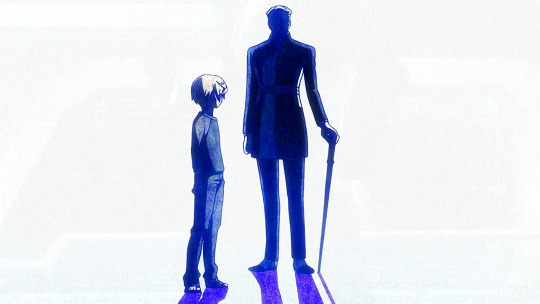
Lord Iznario Fareed is a rich, powerful aristocrat who sexually abuses young blonde boys and inadvertently sets large parts of the plot in motion as part of quasi-villain McGillis' backstory. In a lesser show, Iznario would be the embodiment of the 'predatory queer' stereotype Guin skirts the edge of. Here, however, he is very much not the only 'gay' character present and his proclivities demonstrate one of the many ways the world exploits vulnerable children, a core theme of the series. Early on, we see fleeting glimpses of young girls being pimped out on the streets of Mars. Iznario shows this social failing extends to the much richer Earth and although he is portrayed as the worst among the Gjallarhorn elite, they all abuse their power for personal gain. Thus, as much as the reveal of what he has done carries a certain shock value, it is not present purely for cheap impact. (This isn't the essay to discuss it, but the flashbacks to McGillis being abused as a child are a masterclass in how to frame such things around the victim, clearly communicating what's happening while avoiding gross voyeurism.)
I don't know how deliberate it is the canonical gay character who is shown in an entirely positive light fits the profile of Iznario's victims to a T, but it does underscore we're looking at a case of power allowing people to get away with hideous things, not a stand-in for queerness in general. To an extent I resent having to spell this out, since it seems so obvious Iznario is not fulfilling the role of a homophobic cliché. Sadly, the cliché exists and the point is worth discussion.
Moving swiftly on: Yamagi and Shino.
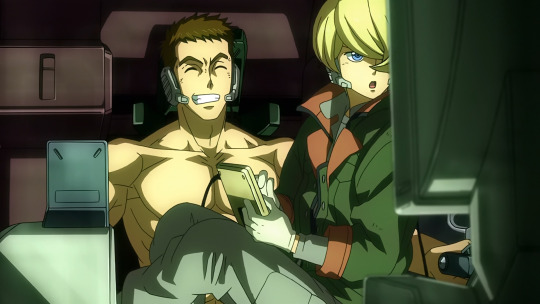
Yamagi Gilmerton is a small, quiet teenage boy with a somewhat withdrawn and acerbic personality, who spends much of Iron-Blooded Orphans nursing a hopeless crush on mobile suit pilot Norba Shino. Like the majority of the cast, Yamagi is a child soldier, but a mechanic rather than a combatant. Additional backstory commentary reveals that he struggled on joining CGS mercenary group due to his physique. Indeed, while this detail is not directly referenced in the anime itself, he is indeed drawn noticeably thinner than the other boys.
Again, we veer towards stereotypes, where a queer character is portrayed as weaker and more effeminate. Yet in spite of leaning this way in looks, Yamagi is an eminently capable person, never treated as lesser for fulfilling a support role rather than being a fighter. If anything, IBO goes out of its way to highlight how vital good mechanics are to mechanised warfare, and we see multiple examples of Yamagi being both assertive and kind of badass. At one point, he scales, unaided, an 18 metre tall mobile suit that's collapsed to its knees. When he and Shino are revisited in spin-off game Urdr Hunt (soon to be some form of animated production), he pilots a spaceship within an active battle-zone, flying escort for a damaged freighter as it retreats. In Season 2, he's comfortable ordering Tekkadan's new recruits around and is the first person to properly chew Orga out for his failings as a leader. Far from being an outlier among the protagonists, Yamagi is equally brave and dedicated to the cause, irrespective of his sexuality.
To be fair, he does tend to clam up and grow more awkward around the object of his affections. To be equally fair, he has the misfortune of having fallen for the most oblivious himbo on God's red Mars.
Shino is a big, boisterous warrior, the polar opposite of Yamagi in personality and physicality. He embodies Tekkadan's machismo, eagerly anticipating the chance to prove their strength and generally being a standard bearer for becoming the biggest, baddest group around. Things are not as straightforward as they seem on the surface, however. He shows a good awareness of when the group is in over their heads – going so far as to suggest retreat in the face of bad odds several times – and he is not nearly as sure of himself as he might first appear. He displays a wide streak of insecurity about his abilities as a soldier, reacting badly to people questioning his dedication or competency. And he crumbles completely when some of his comrades are killed as the result of a split-second mistake on his part, stating a wish to have died in their place. Thereafter, he acts in ways that read as choosing to take all the risks on himself rather than go through more loss. It makes him an interesting mix, someone who acts as a cheerleader, boosting everyone else's morale, while swallowing his own doubts and personal fatalism.
He is also presented as one of the most sexually active members of Tekkadan, using his wages to visit brothels to sleep with women. Indeed, he is frequently found extolling the virtues of the opposite sex, referencing collections of pornography (at least in the English dub), and generally being a very typical teenage boy about such matters.
Given this, you might assume Yamagi is longing hopelessly for a straight man. That is indeed the idea the show teases us with for much of its run (can something be straight-baiting? I feel if anything ever earned that title, it's this). OK, Shino's fond of Yamagi as a friend and frequently relies on his assistance in improving his fighting ability, and per ancillary material, is the one who got Yamagi transferred to the mechanics corps in the first place, rescuing him from struggling in the infantry. And sure, Shino spends an awful lot of time in very close proximity to Yamagi, including literally pulling him into the cockpit to assist with a mission. And yes, Shino is absolutely a flamboyant creature, sporting gold ear studs and an attraction to the colour pink, ensuring his mobile suits are painted all over magenta in order to stand out on the battlefield. And certainly, Shino is extremely empathetic, adjusting his attitude depending on his impressions of other people, such that he dials his boisterousness down in Yamagi's presence, displaying a far more gentle affection than he does with his other friends.
But clearly he hasn't noticed Yamagi is head over heels for him.
Right?
Well, towards the end of Season 2, during another moment where Yamagi is literally sitting on Shino's knee, Shino proposes the two of them drink together all night long once the fighting is over. Not only is this an unambiguously romantic overture (he's asking while pushing aside the fringe that normally covers half of Yamagi's face, in order to look into his eyes properly), it comes after a joke several episodes earlier in which Shino has to explain to a less worldly comrade that a girl inviting you for a drink is not a request to go out with the whole gang but a far more intimate gesture (I say explain, it's more expressing incredulity Akihiro didn't realise Lafter was asking him on a date). Later, it is revealed Shino did indeed work out that Yamagi 'likes' him (to his friend Eugene's exasperation that it took him so long to notice), and he reacted with amazed delight to discover there was someone in Tekkadan who'd fall in love with 'a guy like me'.

He'd assumed because Tekkadan is a family (a description provided by their ally Naze, which everyone just kind of runs with), romantic love wasn't possible between them. Having worked through this mental block and finally realised the blindingly obvious, he renews his desire to protect Tekkadan as long as he lives, refuting his previous view of himself as an expendable human shield and heading out with every intention of surviving all the way to the end.
And because IBO is an exquisitely-written tragedy, he is promptly killed while attempting a futile one-man attack against their enemies, his advances on Yamagi forming part of a long build-up whereby the boy who loves him provides the tools he needs to charge into a suicide run.
Right then. *drags out the reading comprehension soap-box* I have seen some people refer to this as an example of the 'bury your gays' trope, and there is nothing more likely to get me manifesting behind you in the form of an irate shoebill than to do likewise. 'Bury your gays' refers to a tendency for queer characters in fiction to disproportionately suffer tragic fates. This is a writing choice usually rooted in the idea queer relationships are inherently tragic, either because they are viewed as a perversion of 'correct' forms of love, or because of some misguided idea the prevalence of homophobia means queer joy is impossible. I am going to be charitable and concede this is indeed a case where one half of a budding homosexual relationship dies horribly. But, as always, the context matters.
All but one of the romantic relationships established prior to the epilogue of Iron-Blooded Orphans end in death. Of the two that survive in some capacity, one is a heterosexual background romance between two older characters and the other is a pair of women I shall be covering later. IBO is a story about child soldiers that does not shy away from the fact these are teenagers being fed into a meat-grinder. That the director's original intention of killing every named character was toned down (to the series immeasurable benefit, in my opinion) dos not change a narrative arc towards doom.
Within this, Yamagi and Shino aren't singled out for being queer. The coyness around Shino's eventually-evident bisexuality serves to generate an instant of hope and relief right before the rug is pulled from under everyone's feet. Where Shino's death does differ from those of other characters is in presentation: he dies alone and does not get any form of farewell or the passing-on moment afforded to others. But that is only to be expected, since we're talking about the point where it becomes clear there is no saving the situation. It's a cruel, abrupt moment of bad luck, puncturing the heroic idea of scraping victory at the last second. Shino flew out intending to live and he died anyway. A queer relationship forming part of what he was fighting for is an almost incidental detail.
(As an aside, I am aware of two other examples in Gundam fiction where a pilot and a mechanic have a doomed love affair. One is in Char's Counterattack, where a male engineer's romance with a female pilot ends with them both being abruptly killed, and the other is from Gundam AGE, where a female mechanic sacrifices herself for the greater good, leaving a male pilot to mourn her loss for the rest of the series. Shino and Yamagi reiterate this same concept.)
Stepping back from the tragedy, Yamagi's love for Shino is as delightfully underplayed as the other relationships in the show, with little emotional melodrama being wrung from the romance itself. Yamagi can't bring himself to declare his feelings, frequently turning cold instead and perpetuating Shino's misunderstanding of where they stand. Yet Shino ultimately proves enthusiastic for the idea, rendering moot any concerns Yamagi had over getting turned down (going beyond the text, a Q&A with the series' director confirmed Shino was written as bi). Equally, in the aftermath of Shino's death, Eugene comforts Yamagi by relating the truth of Shino's earlier realisation and even going so far as to rebuff Yamagi for implying there's something wrong with him for grieving. This and other interactions in the same episode imply those nearest to the pair were well aware of Yamagi's desires and had absolutely no problem with them. The prevailing attitude within Tekkadan is one of complete acceptance for its members and this is no different.
Indeed, for me, the most important part of how queerness is represented in IBO is that it is treated as just another aspect of the diversity of the cast. I've seen it stated that viewing homosexuality as a natural part of human existence was Tomino's motivation in making Guin gay. IBO presents us with the same idea, far more seamlessly and far more positively.
Now, let's leave the anime proper and look at the same-sex pairing from spin-off manga Iron-Blooded Orphans: Moon Steel.

Deira Nadira and Mina Zalmfort are part of the Gjallarhorn nobility and their marriage was arranged to strengthen relations between their two families. We see an example of a similar political match in the main show, where the heir to the Fareed family, McGillis, is betrothed to the second child of the Bauduins, the much, much younger Almiria. That this can take place regardless of the gender of the participants has big implications for the functioning of a bloodline-focused aristocracy. Presumably it indicates they are happy to use medical technology to ensure the Nadira family continues into the next generation, and if same-sex marriages are thus permitted, that means fewer factors to worry about when it comes to perpetuation. Whether male-male weddings are allowed too remains an open question; given the existence of real-world double-standards, it is possible Deira and Mina represent the only acceptable form of homosexuality. Nevertheless, that it is accepted speaks volumes. Gjallarhorn is not an especially progressive organisation, built as it is on rigid class structures and notions of human purity. Yet here we are.
Perhaps we should have expected that the norms around gender in this system don't correspond to strictly patriarchal patterns from the real world. Carta Issue, a key player in Season 1 of the anime, is the only child of the Issue Family's current leader and positioned as his sole heir, irrespective of the fact she's a woman. The logical inference is that any children of hers would count as Issues, rather than belonging to a potential husband's family. Deira is similarly the heir to her father's position, although intriguingly, it's not outright confirmed if she is his only child or simply the oldest. The possibility exists that gender is a non-factor in determining inheritance.
With respect to sexuality, Deira seems pretty obviously intended to be a lesbian. Her relationship with Mina is presented as one they are both happy with, despite it being an arranged by their parents, and Deira is depicted in the manual for Gundam Gremory's model kit as favouring the clothes of 'a handsome man'. She doesn't present that way within the manga' story, first showing up wearing the standard unisex Gjallarhorn pilot-suit, then wearing a formal gown for a meeting while in an official capacity. But she is depicted wearing masculine clothes in silhouette when initially mentioned and in a post-story panel at the back of the final volume.
(Another aside: the fan translations I use for this part of the manga refer to Deira using male pronouns when she's introduced. However, that could simply be down to the poor quality of said translation; she's consistently referred to using female pronouns in official materials and the game adaptation of this scene has her named as simply 'Lord Nadira', the standard appellation for Gjallarhorn family heads.)
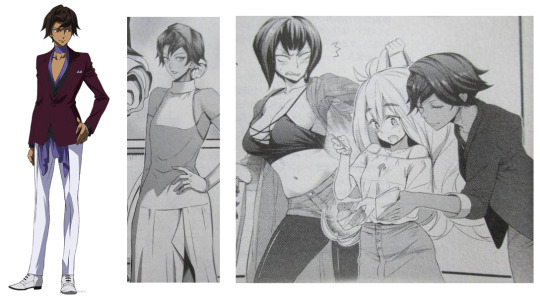
Whether Deira's code-switching is the result of institutional expectations around her role or personal preference, it adds extra texture to her depiction. While civilian garb was designed for the adult version of Carta and closely matches conservative gender expectations for a woman, she's never shown wearing it, so we don't have a point of comparison to judge what's required of a character in Deira's position.
Regarding Mina, you'll notice I grouped her with Shino rather than the characters whose sexuality I consider to be stated outright. With Shino, the nature of his sexuality is not put absolutely beyond question in the text. This is splitting hairs due to the overt nature of what's on screen but the fact remains, the anime doesn't clarify if his being open to Yamagi's love means he already thinks of himself as bisexual, or if this is something he hadn't considered before. With Mina, it's more a case that I'm unwilling to label her one way or the other based on the available information. Deira carries sufficient signifiers, I find little room for doubt over the intention. We also have an outright statement that she holds great affection for Mina regardless of being obliged to consider her an eventual romantic partner. Indeed, she becomes so upset by believing her fiance dead, she runs off to Antarctica in a Gundam. But the exact depth of Mina's feelings in return is not discussed.
In addition, Mina is considerably younger than Deira. McGillis and Almiria's match takes place when he is (probably) somewhere in his late twenties and she is nine, with plans for the union made four years prior. This is not great, to put it mildly, albeit fairly typical of how such things have historically worked for nobility. Based on appearances and how they are treated by the rest of the cast, I would assume Mina to be in her mid-teens, and Deira to be in her early twenties (annoyingly, exact ages are provided for several characters in Moon Steel, just not these two). A less dramatic gap (and I don't believe Mina is meant to be quite as young as her appearance perhaps suggests), yet still significant when one of the people involved is below what we'd consider adulthood.
There is no indication of anything untoward going on, within the confines of the situation, similar to how we're given no indication McGillis is abusive towards Almiria. Any comparisons with Lord Iznario's activities lie purely along the axis of how children are exploited by adults even without suffering directly. All indications are that Deira and Mina have made the most of something they have little choice in. Regardless, I still feel more comfortable describing Mina as open to being in a relationship with another woman, rather than pinning her to a specific preference.
Continuing the theme of things where doubt or ambiguity exist, let's discuss some characters were there shouldn't be any: Atra and Kudelia.
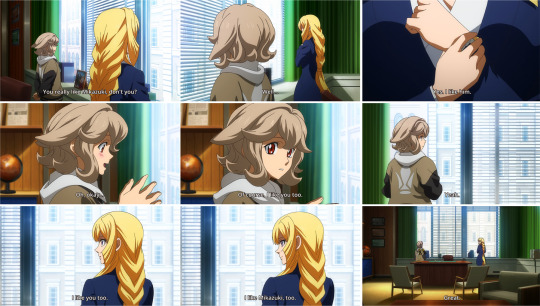
I don't know about you, but I find it extraordinarily hard to read this as anything other than a three-way love-confession. Still, in the interests of fair play, let's review the wriggle room for declaring this something else.
Kudelia Aina Bernstein and Atra Mixta are love interests of nominal protagonist Mikazuki Augus, in an iteration of another tried-and-true trope, that of a male lead inexplicably being attractive to the female characters in his orbit. Or rather, it would be if the show didn't take such pains to demonstrate why these girls fall for him, setting up a long-established crush on Atra's part (rooted in him being the first person in the world to be nice to her) and a mutual respect on Kudelia's that gets spurred to more when Mikazuki randomly decides to kiss her because she 'looked cute' (Mikazuki has the manners of a feral stray raised on the streets, because that's precisely what he is).
Justification aside, this has the makings of a traditional triangle, that is, one without a connecting base, which we might expect to be resolved by either Kudelia or Atra 'losing out'. For a few episodes, this does indeed seem where we are headed. Then Atra discovers the concept of polyamory via the polygamous Turbines group and all bets are off.

Having realised it is perfectly possible for a family to consist of multiple romantic partners, Atra proceeds to work towards ensuring everyone gets everything they want. Strictly speaking, this doesn't mean she is attracted to Kudelia as well – even if she clearly recognises Kudelia as an attractive person from the start and…
You know what? Acknowledging that the information about their eventual marital status was only stated in interviews at live events with no official record and seems to have been framed around raising the son Atra has with Mika, I'm going to abandon the pretence of both-sided objectivity and go straight for the throat. Turns out my patience for soft-footing this lasts about as long as it takes to say 'bi-erasure'.
Over the course of Season 1, Atra not only decides the end-game is some form of three-person wedding, she also:
Shows no jealousy over Mikazuki and instead chides him for not providing the correct emotional support to the girl he kissed.
Spends a great deal of time with Kudelia and enthusiastically throws herself into furthering Kudelia's goals, without necessarily understanding the technicalities.
Covers for Kudelia by pretending to be her during a confrontation with Gjallarhorn soldiers, getting herself soundly beaten up in order to prevent them from chasing after the real deal.
Drives an armoured car through a battlefield for Kudelia's sake, safely delivering her to a vital rendezvous.
Leaps in front of a massive mobile suit to push Kudelia out of its path, physically shielding the other girl with her body.
As much as it pains me to resort to the 'if this were a man and a woman, would it read as romantic' crudity – yes! Yes it would! Especially since in Season 2, Atra presents Kudelia with a good-luck charm bracelet she has woven, something she previously did for Mikazuki explicitly out of having a crush on him. I'm all for embracing platonic love (which is why Takaki and Aston are not featuring in this rundown) and there's nothing in the above list necessarily entailing attraction beyond deep friendship. But when Atra consciously repeats her actions towards Mikazuki (someone she goes on to definitely have sex with) with Kudelia and it leads to the scene between them where they declare how they feel about each other and Mikauki, looking for non-romantic angles takes more effort.
After all, if we are to read Shino's openness to Yamagi's affection from the things he says and how he looks saying them, we can certainly do the same for Atra and Kudelia's use of the word 'like' in reference to one another and their reactions to hearing it said of them. (Obligatory note that if there is some nuance in the original Japanese the translation doesn't capture, I'd love to hear about it. The English scripts, however, leave little to the imagination.)
It is indisputable that Atra feels a strong affection towards Kudelia and while I have been focusing on her a lot (she is by far the most proactive member of the triad), Kudelia reciprocates at every opportunity she is presented with. Even if there truly wasn't an intention to portray this as exactly equivalent to Atra and Mikazuki, the end result manages to be on par with Yamagi and Shino. Consider Kudelia and Mikazuki, for example. In terms of portrayal and the two-girls-one-guy trope being explored here, they have the same level of chemistry and the same absence of overt consummation as Kudelia and Atra, and it would hardly be a serious position to claim the show does not place the two of them in romantic conjunction, now would it?
You may at this point be wondering why I am getting so defensive of reading Kudelia and Atra as romantic partners. Honestly, I am too. On reflection, I think it's because IBO is playing around with such a worn-out and insipid means of wringing drama from characters who should know better, I keep searching for the catch. And yet there isn't one. This show really did respond to a nascent love chevron by having the mousy, homely girl tell the governor's beautiful daughter to shut up and get in the polycule, and turned it into a true triangle.
That's wonderful. I cannot properly express the wave of joy and relief that came over me when I realised this was the direction they were taking. It ends in tragedy, of course, Mikazuki giving up any chance of a peaceful life to die in battle, far away from the women who love him. But their lives continue because of his sacrifice and by all appearances they remain together. In some ways, for the overarching message of hope persisting on the back of heartbreak, the precise details of that arrangement don't particularly matter. So why not take the gayest reading possible?
What an excellent segue into a blink-and-you'll-miss-it, probably-stretching-too-far, nonetheless-compelling potential bit of queerness: Chad in the series epilogue.

One of the many tertiary characters in Tekkadan, Chad Chaden has minor speaking parts throughout Season 1 and a larger role in Season 2. He initially appears during a particularly dire early moment when it looks like everyone is about to be killed by attacking mobile suits. His obvious resignation to this fate sets the tone for a rather dour personality, at least while on the clock. Chad starts out as human debris, a person enslaved after a space battle and sold to the CGS military group as free labour. This gives him a very matter-of-fact attitude towards fighting and the kill-or-be-killed nature of being forced into it – he voices the sentiment that even when facing other human debris, they can't afford to show mercy.
Off the clock, Chad displays a more sensitive personality. He seems studious, learning about interplanetary communications from Kudelia's maid Fumitan and later being promoted to leader of Tekkadan's Earth branch. He has some difficulty acclimatising to being treated as a free person, proving unsure about the concept of wearing a smart suit instead of his normal fatigues. And he grows anxious when he returns to Mars to discover nobody told him two of the few adults in the group (Yukinojo and Merribit) had started dating, worrying that he's no longer 'one of the guys'.
The most we learn about his relationship preferences prior to the series epilogue comes in a comedic sequence about a third of the way into Season 2, when Shino suggests a trip to a local brothel. Eugene responds by proclaiming that he's realised money will not buy him true love. This prompts Chad to ask Merribit if this is true and, on her saying she supposes so, opts out of the trip as well. Judging by his body-language in the next frame where he appears, this is possibly a decision he regrets – perhaps owing to his anxieties, since he just passed up the chance for some team-bonding.
None of this is directly relevant to the topic of this essay. If anything, the scene I just described suggests that, like Eugene, Chad has previously gone along with Shino in paying for sex with women, only to discover he wanted more than just physical intimacy. But then we get the exchange in Kudelia's office during the last episode, following a time-skip after Tekkadan's defeat and dissolution. Now working for Kudelia as an assistant of some kind, Chad notes that Merribit is shortly to give birth to her and Yukinojo's second child, saying he and Yamagi intend to meet up later to plan a celebration. Eugene reacts with amused disbelief, accusing them of just wanting an excuse to go out drinking, to which Chad retorts, 'what's wrong with that?'
And the thing is he's blushing when he does. Which may simply be because Eugene is accusing him of slacking off – IBO characters blush all the time and their embarrassment is frequently to do with being caught acting immature or otherwise against how they want people to see them. But given the weight that 'drinking the night away' carries in regards to Yamagi following Shino's actions shortly prior to his death, it is easy to speculate this represents something more specific.
As far as I can recall, Chad and Yamagi do not interact at all over the course of the show's two seasons, meaning these lines present a rather unexpected combination of characters. Eugene would have seemed a more likely candidate to associate with Yamagi. He's positioned as Shino's closest friend, he comforts Yamagi over his grief, and they are together for much of the climax to the series' plot. So what has happened in the years since, that Eugene's teasing should elicit a blush from Chad instead?
If we put on our shipping goggles, it's far from a nonsensical pairing. Chad goes through an arc not too dissimilar to Shino's. He is knocked into a coma while protecting an ally from a bomb blast and subsequently the Earth branch gets swept into a war orchestrated by one of the factions within Gjallarhorn. On recovering, he blames himself for the many deaths that result, echoing Shino's line about thinking it better if he'd died in place of his comrades. On returning to Mars, he jumps head-first into mobile suit training, determined to make up for his perceived failure as a leader and cheering himself up through rigorous activity. Different though their personalities appear on the surface, there are clear commonalities here. Further, Chad's responses to his traumatic experiences have a more measured quality to them than Shino's. He is not nearly as reckless and provides clear directions to his comrades even while acting as a decoy against a dangerous enemy, rather than abandon any attempt to be an effective leader. Taken together, and coupled to a more long-term view of romance, these qualities might make him a 'safer' version of things Yamagi loved about Shino, creating space for them to be drawn together.
Or perhaps they're simply the most logical points of contact between the ex-Tekkadan survivors at the Admoss Company and Kassapa Factory and intend to make that an excuse to get companionably plastered for no greater reason than it being a nice time. I am speculating over a couple of lines and an animation choice. Nevertheless, it does not feel like unreasonable speculation. When we already have a veritable gaggle of characters who are queer or may trivially be read as such, it's hardly a stretch to assume one more.
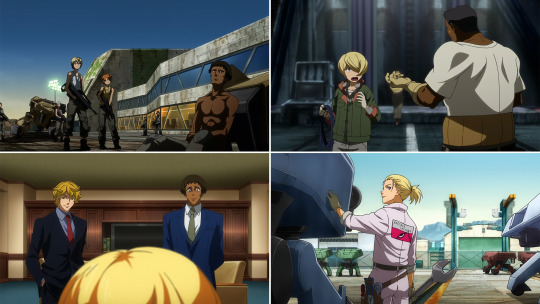
Chad/Yamagi doesn't appear to be a thread the fandom at large has pulled on much, likely because the pairing of Shino and Yamagi is so prominent, it eclipses a mere throwaway possibility. But I'm glad it exists within easy reach. And even if we take off our goggles, these lines demonstrate life for the characters has not stopped. The ex-slave and the gay kid are not stuck, trapped by the tragedies of their past. They have instead grown in both confidence and happiness and now have peaceful, stable lives where they're on going-out-drinking terms. That above all is why I wanted to explore this exchange: it reinforces Iron-Blooded Orphans' rejection of the idea the suffering people like Chad and Yamagi go through is perpetual or inevitable.
OK, one more character to look at. Let's talk about Orga and asexuality.
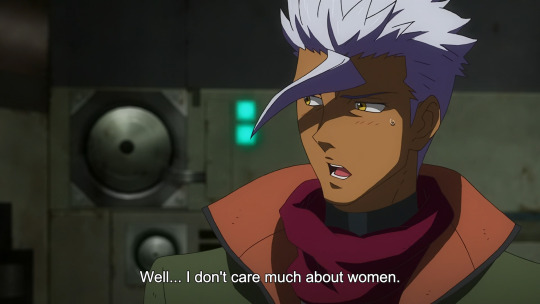
Orga Itsuka, leader of Tekkadan and instigator of the series' events, is notable for his charisma, his drive to provide a safe home for his comrades, and his complete unsuitability for the grown-up activities he attempts. Trying to party all night leaves him puking up his dinner. He forces himself into a suit and tie to handle the administration of a break-out paramilitary company, despite finding it stultifying and bewildering. His goals spin like a weather-cock, as he's surrounded by older characters possessing strong convictions while unable to stick to his own. And he is ultimately undone by an unwillingness to ask for help, having assumed that, as leader, he must decide everything alone.
I suspect his expressed lack of interest in women is intended to help convey overall immaturity. Orga is a good soldier and tactician, but he plainly isn't prepared for adulthood, lacking the grasp on the complexities of life that implies. Making him uncomfortable about sex serves to heighten the impression of a teenager trying to navigate circumstances for which he's not yet ready.
Relatedly, it should be stressed Orga stating he 'doesn't care' about woman is a response to Eugene asking if he agrees love and kindness are what's important, as opposed to Shino's endorsement of boobs. On hearing this response, Eugene proceeds to mock his commander for inexperience. That he himself has only just had his first sexual experience with another person and previously said much the same about not caring about sex simply proves hypocrisy is a fundamental aspect of Eugene's characterisation. The whole scene is very teenage.
Matters have not improved much when Orga and Eugene's dynamic is revisited in one of the side-stories released via the Iron-Blooded Orphans G mobile game. A year and change later, Eugene continues to act superior about having 'experience' where Orga doesn't.
Orga takes this rather poorly.

(Subtitles by @trafalgarlog)
Eventually Merribit has to shout at them to stop being brats, shaming them for behaving like argumentative children. It's funny – and then you remember they basically still are children and this is headed towards more carnage that will not spare them for being young. Such it is to engage with Iron-Blooded Orphans.
What does any of this tell us about Orga's sexuality? In principle, taking it as a device to convey immaturity, nothing. Orga's persisting virginity could simply mean he's not worked out this aspect of himself yet. He is a busy young man who likely hasn't had the time to try.
Alternatively it could mean he is gay. Mikazuki/Orga is an extremely popular ship in the fandom and we might take Orga's professed lack of interest in women as 'evidence' of him swinging the other way.
Or we could take my view, that Orga is asexual and his embarrassment is rooted in just not getting what the big deal is.
To immediately clarify, I don't think he is ace because he 'hasn't worked out what he wants', I think he's ace because he blushes on admitting he doesn't care about women and does not try to prove otherwise once he's in a position where he could easily do so. In circling back to the same joke for the side-story, the writers portray Orga as continuing to be uninterested in sex and sensitive over being needled about it. Again, a feasible interpretation is that he's into guys. Yet this is an argument with Eugene, whose response to the idea of Yamagi being in love with Shino is basically 'you mean you didn't notice?' Eugene is a dork and jerk; he isn't bigoted. None of the Tekkadan guys are. It's unclear if homophobia is even a factor in the setting. Sexism is, but when someone as superficially macho as Shino is comfortable with male/male attraction, and there are same-sex weddings inside Gjallarhorn, we cannot assume stigma exists around being gay. So why should Orga be worried, unless it goes beyond a question of who you're attracted to and into the answer being 'nobody at all'?
When you're surrounded by people who happily wax lyrical about how the joys of sex make you a real man, the absence of a libido might easily become a sore point.
Again, I'm supposing. Again, there is room to do so. As I touched on with Chad, it is easy to read queerness into the text when the assumption of straightness has been taken away, which is something this show does wholeheartedly and deliberately.
Orga Itsuka is one of the first characters I looked at and realised, not only shouldn't I assume heterosexuality, I shouldn't assume sexual attraction at all. I cannot credit Iron-Blooded Orphans alone with this. I do credit it with being a piece of media that applies itself to inclusiveness in ways quite remarkable for a show about giant robot fights, produced to market toys.
The word we want here is 'normalisation'. IBO has a lot to say about what constitutes 'normal' and a lot of it accords well with my own views, particularly those that have me twitching whenever anybody demands we 'be normal' about something. Normality is horrible. It is cruel and it is callous. 'Normal' is a world run on exploitation, on slave labour and on police savagery. Normal is children forced to risk their lives to earn the money required to feed themselves, because it is normal for their parents be gone, or incapable of supporting them. War is normal. Corruption of political systems is normal. Death coming more rapidly for those deemed expendable by society is very, very normal.
But so is protest. The drive to do something, to change things. The capacity for caring about each other. Love. 'Normal' is just a statement about what surrounds us every day, for worse and for better. In too many pieces of fiction, normality is narrowed, rendered a neater, cleaner picture, often excluding the kinds of people we might run into on the street, or walk past, or see on the news, distant and dehumanised.
Queerness is normal, yet for a long time it has been one of the first things to be cut out of fictional worlds. And when it is present, it's a big deal. An object lesson or a cry of triumph over breaking free of unfair strictures. I love stories about queer joy and victory. Heck, I'm a sucker for a good, soppy gay romance. But these aren't the only kinds of stories we tell. Sometimes we need to reflect the worst aspects of the world and what it does to normal people.
In attempting this, Iron-Blooded Orphans commits to an idea of 'normal people' that includes those who are gay or bisexual, those of colour and those we'd call white, the polyamorous, the illiterate, the desperate, the powerful, those who throw themselves into the fight with everything they have, and those who are simply kind. Those who are accepting, understanding and compassionate. Those who need to be accepted, who struggle to be understood, who suffer for a lack of compassion.
There are all sorts of people in IBO and – as a certain cheery, violent dumbass once said – man do I love it. I don't believe it is reading against the spirit of the thing to imagine more diversity than gets outright stated, to interpret one of the leads as ace or suppose another side character is bi or pansexual. It would seem entirely natural if they were.
Everyone's welcome here, down among the debris and the bloodshed, where hope is precious and fleeting and still somehow endures. So why shouldn't we raise a few extra pride flags?
Queer as in 'fuck you'
This all said, taken as a whole, Iron-Blooded Orphans is not a story about queerness or queer romance. Nowhere is this clearer than in its ending.
I skipped over the framing of the final scenes of the anime when I discussed Kudelia and Atra. They form a striking contrast with the ending of The Witch from Mercury, where the conclusion is directly focused around Suletta and Miorine's love for one another, their bonds of wedlock, and the happiness they have found together. This follows from the show being primarily about their relationship. In Iron-Blooded Orphans, the ending focuses not on Kudelia's feelings toward Atra, but those she has for Akatsuki, Mikazuki's son, with Eugene even saying she's eager to go see 'the man she loves', setting up a brief moment of uncertainty over who the character with Mikazuki's outline actually is.
The nature of Kudelia and Atra's relationship post-time-skip is implied rather than stated: in the English versions of the script, they do not refer to each other using terms suggesting they are married, although Atra has dropped her habitual 'Miss' from the front of Kudelia's name. They do not have wedding rings (redundant as those would be alongside the charm bracelets) and Akatsuki does not call Kudelia 'mom'. That they are raising him together is suggested very strongly, in line with Mikazuki asking Kudelia to be guardian of his child if he died. There are non-romantic ways of taking this idea, though, and none of these are closed off as viable interpretations.
But why should we expect some definite statement about romantic status when the point being conveyed is how Tekkadan's legacy continues to shape the world? This is a story concerned with the exploitation underpinning the world and the effort required to make even the smallest wide-scale change. It is about how people trapped at the bottom of the pecking order are still people, still human, messy and complex. It is about their pointless deaths, they ways they struggle on until those deaths come for them, and why they matter, even if the world forgets them.
Mikazuki, the living weapon, the human sacrifice for Orga Itsuka's reckless ambitions, leaves behind a child who will grow up in a more peaceful time, in a society slightly better off than when he and Orga were starving on Chyrse's streets. He doesn't live to see it; Akatsuki does. For all the failures, the attempt wasn't a waste. Don't you dare disrespect the people who died by saying it was.
This is where the epilogue centres, on Akatsuki and on Kudelia's cherishing of the world Mikazuki and everyone else built. Atra and Kudelia's relationship is there, a part of the gentler life they now have (Atra's desires were always towards the version of her existence where Mikazuki retires to a farm; here she fulfils the dream with Kudelia alone). It just doesn't need to take up space for the ending to land.
Yet, as I pour over how queerness is incorporated into Iron-Blooded Orphans, I find myself considering the struggles queer people face in reality. The victims of the AIDS crisis, dehumanised by indifferent institutions. Section 28 and the attempted destruction of knowledge around non-heterosexual forms of love. Riots and campaigns, voices raised loud and proud. How we are equated with dirt and corruption, reduced down to facts others find disgusting. The name-calling. The petty, pathetic posturing that makes everyday existence pointlessly harder.
So it goes for space-rats and degenerates alike.
I am lucky. My life is about as far from that of a child soldier as it is possible to get. My sexuality has been largely invisible. My gender matches the one most favoured by my society. I still have more common cause with those born in poverty on the other side of the world than I will ever have with the aristocrats and billionaires who shape the direction of my country. Because we hold many causes of misery in common. Because we share the same capacities for joy and suffering. Because our humanity is so easily cast aside by those we will never be able to touch.
There is always a place for stories uncomplicatedly about queer love conquering all. Equally, it is important to recognise the places queerness overlaps with stories about the many other ways the world casts people out. It is vital to be able to explore loss, futility and heartbreak. It is essential to capture why we strive onwards despite how heavily tragedy might weight us down.
We may be doomed. Our lives still matter. To ourselves, to each other and, whether they remember or not, to those who come after us.
So, no: for all the queer characters it contains and the many more we might trivially imagine queerness into, Iron-Blooded Orphans is not gay in the vein of The Witch From Mercury. It is not a happy story.
But it is a tenaciously hopeful one and, from certain angles, that alone looks queer as hell.
---------
Happy UK/US Pride Month – in honour and memory of Marsha P Johnson and everyone else who refused to go quietly.
I shall leave you with one of the least straight things ever to be included in any Gundam show.

[Index for further writing]
#gundam iron blooded orphans#gundam ibo#g tekketsu#tekketsu no orphans#gundam#turn a gundam#reference#notes#queerness#queer love#queer characters#analysis#spoilers#queer is a reclaimed slur and a term I apply to myself#heaven help you if you think this is the place to argue about that
99 notes
·
View notes
Note
was sardonyx also kept in the dark about gem related stuff (like amethyst)? or were pearl and garnet more open about it than rose?
oh they definitely kept her in the dark; i feel like the three of them had some sort of unspoken agreement to keep the kids away from the worst stuff that they were running from

pearl would especially not want her to know that she was a mass produced servant not even classified as a gem according homeworld, but i think sards would learn that one way or another which would induce a very uncomfortable but needed conversation with her mom
garnet wouldn’t be very vocal about the war or their past because she thinks it wasn’t anything pretty that she would want her daughter to worry about at any point. just because they went through hell and back to be able to live as who they are doesn’t mean her baby needs to carry all that baggage with them
i think that with sardonyx around they would have a better approach when handling steven and the burden of living in roses shadow. they would stay more conscious about not putting unnecessary expectations onto him once they had realized he’s a different person than rose
and i imagine that if gemlings had a reason to exist in the gem society at any point, it can’t have been for anything good and definitely didn’t happen under fun circumstances that they would want sardonyx to be aware of. similar to amethyst, just because their existence and role on homeworld would be something bad doesn’t mean that they are inherently, too
maybe gemlings were the prototype gems? maybe if the injectors were wired wrong they would create baby gems but that wouldn’t make much sense
maybe it was a way to raise the number of gems before injectors were even introduced? a practice borrowed from organics, and with pearl being 11 thousand years old she would still be made during the time which gem expansion via gemlings was slowly dying out. maybe most pearls during that time were designed with that in mind and she got the lucky ticket lol
i don’t want this to turn into one of these weird questionable pregnancy gemling au so i’ll leave this plot point at that i think lmao but however it would go, that’s also def stuff pearl and garnet would not want sards to know about. they would want both her and steven and amethyst to experience the freedom of earth. it shouldn’t matter to them how or why they would exist on homeworld, they’re earthlings
30 notes
·
View notes
Text
Writing Quirks List
I’ve kept some of my oddities for quite some time now, ever since I started writing my fantasy book, In Nemynd, There’s Dagny the Walking Tree. At first, I thought I was too weird for the writing community. But as the years went by, I met and discovered several poets and authors of my time and learned of their quirks and habits. I realised I’m not that special. There are many creatures of my kind.
And I thought: Well, that’s why we’re writers. We’re too weird for this world, so we had to build our own and shove our strangeness into it—or neatly arrange it, you might say, depending on your nature.
So I’ve made a list of some of the things I practice. Things I’ve noticed aren’t exactly observed by “normal” people. You might relate to this. Or you might think it’s too normal. How would I know? Comment, please? So I can gauge my weird level.
Inventing whole languages and using them on my weirded-out kids.
Creating long scrolls of a character’s family tree, only for them to die in Chapter 4.
Mentally debating over hot chocolate about war ethics. “Is it a war crime if the Wolves consume thieving Goblins?”
Casually Googling “How many Faeries to eat to feel satisfied?”—WHILE OUT WITH FRIENDS.
Finalising chapter titles before the book title. “Chapter 1 is Skits of Runic. The book? Might call it Book 2.”
Also Googling medieval insults like “Sard off!” or “Knave!” and using them on actual officemates.
Writing dialogue in accents and voices I imitate, like quietly gurgling as I type a Welsh-accented line spoken by a gurgling troll.
Creating strict magic systems and then getting confused by my own system to the point I forget I even made one. “What’s the point? Ugh.”
Developing crushes on red-flag characters I created. “I know she’s evil, but I’d still marry her if she were real.”
Worrying my MC will be mad at me if I write her into a tough spot, as if I’m not the god of her world.
Holding long, intense conversations with my characters in my head. Like a witches’ coven meeting. While I’m in the shower.
Naming fictional bed bugs like “lazy bug” and getting offended when people say “ladybug,” as if mine was the original.
Swearing oaths like “Oh, for Foboff’s sake!” when I spill coffee.
Spending entire days researching historical outfits... for one sentence. “She was wearing a translucent kimona blouse with nothing underneath.” Yup. Totally worth it. I'm so proud.
Using my fantasy world’s logic to argue in real life. “So if words have power in themselves, why would it require a witch’s DNA to effectively cast a spell, babe?” Then my husband just stares into the void like he heard a wraith whisper through the wind.
Shouting “THAT’S NOT CANON!” at my own Word doc—and furiously deleting all the pages.
Weaving “spells” (patterns) in the air, genuinely believing something will happen.
Over-describing things not necessary to the plot. “Around her neck hung a silver necklace with a spherical pendant, inside which a tiny sailman stood, waving to its spectator and tipping its magician’s hat.” This necklace, by the way, is mentioned only once.
Creating full calendars with invented moon cycles, feast days, and six names for March. “World Nemynd Day. 6th Day of Ricebreak, Year of the Goat.”
So that’s my list. Yours is probably better if this were a competition. No, this isn’t a complete list. I’m sure I’ve forgotten more strange habits I’ve yet to discover again.
But anyway, love yourself and all your oddities. You’re a writer. Of course, you’re weird.
#writing this whole thing while my husband is growling sepultura in the background#weirdcore#writers on tumblr#spilled words#behind the scenes of writing#novel writing#fantasy writing#writers and readers#writeblr
2 notes
·
View notes
Note
hi friend sard! question inspired by my brain deciding this is the absolute best time to start trying to write a coming of age story despite having so much work to do / catch up on and having one of my finals tmrw: how would ezra act in a coming of age story? this could be a more realistic one, like him moving schools as a kids, or one with supernatural :] elements, like development of powers or traveling to another world or smthn
interesting one! honestly if there were ever going to be a coming of age movie staring or even featuring ezra, it would be of a summer camp type situation. the whole shebang. he's a camp counselor trying to find a way to occupy the hot summer hours, make new friends his age, all while beating the heat. the movie would be spent either with him as the comedic side relief to the two other counselors that are obviously the stereotypical love interests, making friendship bracelets with the kids, or just straight up being the protagonist that ends up finding himself amongst buggy weather and spilt soda.
or at least that would be the plot, if it wasn't for the last hour of the movie that is spent focusing on the slaughter of the camp, ending in him falling down a well escaping from said slaughterer— the likes of which has fangs and fingernails sharper than knives
#ORGIN STORY EZRA YAYYY#he'd be about nineteen or so in this situation#you thought yoy were getting coming of age. and you are#up until i break out the canonical experience that starts him in the direction of the winchester's years before even meeting them.#the movie would take place in the eighties since ezra was born in the mid to late seventies#obsessed with movies that seem to be one genre going entirely to plan and amazingly smooth until boom. inexplicable horrors.#sona shenanigans#sardonics moots
7 notes
·
View notes
Note
Hi! Coming out of the woodwork to say I'm so glad to find even if it's just a small amount of people still in this Fandom! I love greedfall especially Kurt and Constantin! And have you played the DLC? What did you think of it?
Hope you have a great day!
HELLO! I’m loving all these greedfall interactions, ppl in the active fandom gotta stick together lmao
I HAVE played the DLC. I enjoyed it! They had some new outfits and weapons that were in the De Vespe family style, which didn't have fantastic stats or anything, but we're still super neat to look at (and play dress-up with lol). The storyline itself was good too! Now obviously it's just a DLC so it’s not as fully fleshed out as the actual game's plot, but it was a nice bit of change from the main quest. I liked interacting with more ppl from the continent and navigating all that political treachery. PLUS the DLC unlocked some EXTREMELY cute dialogue between De Sarde and the love interest (mine was Kurt obviously). They had a cute little conversation abt getting married after everything was over and my heart MELTED. I wish the DLC unlocked another romance cutscene, because like come on! De Sarde and Kurt just talked abt getting married! LET THEM SMOOCH. But unfortunately not, have to go the fanfic route for that.
(I included Kurt's DLC marriage conversation below the cut if you're interested<3)
De Sardet: You seem worried. What’s wrong? Don’t tell me Aurelia’s scheming has you frightened? Kurt: I’m worried about you, of course, but I’m sure you'll defeat her, that’s not what’s worrying me. De Sardet: Please, tell me what’s wrong? You do know you can tell me? Kurt: Yes, of course. It’s this whole wedding contract business. I’m sure the prince already has some dashing fops lined up to marry you. De Sardet: That’s very possible, you know him as well as I do. But we can always pull the rug out from under him… Kurt: What do you mean? De Sardet: We can wed, once this is over. What can he say? He’s halfway around the world! Kurt: Do - do you really mean what you just said? You do realize that I’m just an insignificant mercenary to him? He would see it as a mismatch. You would surely lose your position as legate. De Sardet: He’ll certainly be furious and reprimand me…but I doubt he’d do much else. He already did his utmost to use me in his machinations on this island. He won’t just give that up. So…what do you think? Kurt: I think I'll be the happiest man in the world when I lead my bride to the altar. I love you so much. De Sardet: I love you too, Kurt.
#UGH i would very genuinely die for this pixelated man#I'm rambling again#greedfall#asks#kurt greedfall#greedfall video games
13 notes
·
View notes
Text
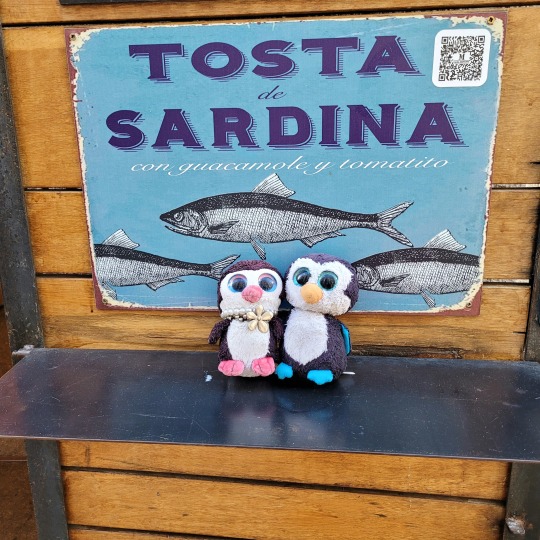


2023/07/08 Mi amiguita quería cenar pescado, bien sardinas o atún, pero los bares del centro estaban llenos. Al final, encontramos una mesa en una terraza al lado del río y pedimos hamburguesa.
My girlfriend wanted to have fish for dinner, either sardines or tuna, but the bars in the center were full. In the end, we found a table on a terrace next to the river and ordered a hamburger.
Google Translation into French: Ma copine voulait manger du poisson pour le dîner, soit des sardines, soit du thon, mais les bars du centre étaient pleins. Finalement, nous avons trouvé une table sur une terrasse au bord de la rivière et avons commandé un hamburger.
Google translation into Italian: La mia ragazza voleva mangiare pesce per cena, sarde o tonno, ma i bar del centro erano pieni. Alla fine trovammo un tavolo su una terrazza vicino al fiume e ordinammo un hamburger.
Google Translation into Portuguese: A minha namorada queria comer peixe ao jantar, sardinha ou atum, mas os bares do centro estavam cheios. Finalmente encontrámos uma mesa numa esplanada junto ao rio e pedimos um hambúrguer.
Google Translation into German: Meine Freundin wollte zum Abendessen Fisch essen, entweder Sardinen oder Thunfisch, aber die Bars im Zentrum waren voll. Schließlich fanden wir einen Tisch auf einer Terrasse am Fluss und bestellten einen Burger.
Google Translation into Albanisch: E dashura ime donte të hante peshk për darkë, ose sardele ose ton, por lokalet në qendër ishin plot. Më në fund gjetëm një tavolinë në një tarracë buzë lumit dhe porositëm një burger.
Google Translation into Armenian: Ընկերուհիս ցանկանում էր ընթրիքին ձուկ ուտել՝ կա՛մ սարդինա, կա՛մ թունա, բայց կենտրոնում բարերը լիքն էին: Ի վերջո, մենք գտանք սեղան գետի մոտ գտնվող պատշգամբում և պատվիրեցինք բուրգեր:
Google Translation into Bulgarian: Приятелката ми искаше да вечеря риба, сардини или риба тон, но баровете в центъра бяха пълни. В крайна сметка намерихме маса на една тераса до реката и си поръчахме бургер.
Google Translation into Czech: Přítelkyně chtěla mít k večeři rybu, buď sardinky nebo tuňáka, ale bary v centru byly plné. Nakonec jsme našli stůl na terase u řeky a objednali si burger.
Google Translation into Croatian: Moja djevojka je htjela ribu za večeru, bilo sardine ili tunu, ali lokali u centru bili su puni. Na kraju smo našli stol na terasi uz rijeku i naručili burger.
Google Translation into Danish Min kæreste ville have fisk til aftensmad, enten sardiner eller tun, men barerne i midten var fyldt. Til sidst fandt vi et bord på en terrasse ved floden og bestilte en burger.
Google Translation into Slovak: Moja priateľka chcela mať na večeru rybu, buď sardinky alebo tuniaka, no bary v centre boli plné. Nakoniec sme našli stôl na terase pri rieke a objednali si burger.
Google Translation into Slovenian: Moja punca je hotela za večerjo ribo, bodisi sardele ali tuno, a so bili lokali v centru polni. Končno smo našli mizo na terasi ob reki in naročili burger.
Google Translation into Estonian: Mu sõbranna tahtis õhtusöögiks kala, kas sardiini või tuunikala, aga kesklinnas olid baarid täis. Lõpuks leidsime jõeäärselt terrassilt laua ja tellisime burgeri.
Google Translation into Suomi: Tyttöystäväni halusi syödä illalliseksi kalaa, joko sardiinia tai tonnikalaa, mutta keskustan baarit olivat täynnä. Lopulta löysimme pöydän terassilta joen varrelta ja tilasimme hampurilaisen.
Google Translation into Georgian: ჩემს შეყვარებულს უნდოდა ვახშამზე თევზი, სარდინი ან ტუნა, მაგრამ ცენტრში ბარები სავსე იყო. საბოლოოდ, მდინარის პირას ტერასაზე მაგიდა ვიპოვეთ და ბურგერი შევუკვეთეთ.
Google Translation into Greek: Η κοπέλα μου ήθελε να δειπνήσει ψάρι, είτε σαρδέλα είτε τόνο, αλλά τα μπαρ στο κέντρο ήταν γεμάτα. Τελικά βρήκαμε ένα τραπέζι σε μια βεράντα δίπλα στο ποτάμι και παραγγείλαμε ένα μπέργκερ.
Google Translation into Hungarian: A barátnőm halat szeretett volna vacsorázni, akár szardíniát, akár tonhalat, de a központban a bárok tele voltak. Végül találtunk egy asztalt egy folyóparti teraszon, és rendeltünk egy hamburgert.
Google Translation into Dutch: Mijn vriendin wilde vis eten als avondeten, sardientjes of tonijn, maar de bars in het centrum zaten vol. Uiteindelijk vonden we een tafeltje op een terras aan de rivier en bestelden we een burger.
Google Translation into Norwegian: Kjæresten min ville ha fisk til middag, enten sardiner eller tunfisk, men barene i sentrum var fulle. Etter hvert fant vi et bord på en terrasse ved elven og bestilte en burger.
Google Translation into Polish: Moja dziewczyna chciała zjeść na obiad rybę, albo sardynki, albo tuńczyka, ale bary w centrum były pełne. W końcu znaleźliśmy stolik na tarasie nad rzeką i zamówiliśmy burgera.
Google Translation into Romanian: Prietena mea a vrut să ia pește la cină, fie sardine, fie ton, dar barurile din centru erau pline. Până la urmă am găsit o masă pe o terasă de lângă râu și am comandat un burger.
Google Translation into Russian: Моя девушка хотела на ужин рыбу, сардины или тунец, но бары в центре были полны. В конце концов мы нашли столик на террасе у реки и заказали гамбургер.
Google Translation into Serbian: Моја девојка је хтела да вечера рибу, било сардине или туњевину, али барови у центру су били пуни. На крају смо нашли сто на тераси поред реке и наручили пљескавицу.
Google Translation into Swedish: Min flickvän ville ha fisk till middag, antingen sardiner eller tonfisk, men barerna i centrum var fulla. Så småningom hittade vi ett bord på en terrass vid floden och beställde en hamburgare.
Google Translation into Turkish: Kız arkadaşım akşam yemeğinde sardalye ya da ton balığı yemek istiyordu ama merkezdeki barlar doluydu. Sonunda nehir kenarındaki terasta bir masa bulduk ve bir burger sipariş ettik.
Google Translation into Ukrainian: Моя дівчина хотіла пообідати рибою, або сардинами, або тунцем, але бари в центрі були повні. Зрештою ми знайшли столик на терасі біля річки і замовили бургер.
Google Translation into Arabic: أرادت صديقتي تناول السمك على العشاء، إما السردين أو التونة، لكن الحانات الموجودة في المركز كانت ممتلئة. في النهاية وجدنا طاولة على شرفة بجانب النهر وطلبنا برجر.
Google Translation into Bengali: আমার বান্ধবী রাতের খাবারের জন্য মাছ খেতে চেয়েছিল, হয় সার্ডিন বা টুনা, কিন্তু কেন্দ্রের বারগুলি পূর্ণ ছিল। অবশেষে আমরা নদীর ধারে একটি বারান্দায় একটি টেবিল পেলাম এবং একটি বার্গার অর্ডার করলাম।
Google Translation into Simplified Chinese: 我女朋友晚餐想吃鱼,要么是沙丁鱼,要么是金枪鱼,但是中心的酒吧已经满了。 最终我们在河边的露台上找到了一张桌子并点了一份汉堡。
Google Translation into Korean: 내 여자친구는 저녁으로 정어리든 ���치든 생선을 먹고 싶었는데 중앙에 있는 바가 꽉 찼습니다. 결국 우리는 강 옆 테라스에 테이블을 발견하고 버거를 주문했습니다.
Google Translation into Hawaiian: Makemake kaʻu hoaaloha e ʻai i ka iʻa no ka ʻaina ahiahi, ʻo ka sardine a i ʻole ka tuna, akā ua piha nā kaola ma waenakonu. Ma hope ua loaʻa iā mākou kahi papaʻaina ma kahi pā ma ka muliwai a kauoha mākou i kahi burger.
Google Translation into Hebrew: חברה שלי רצתה לאכול דגים לארוחת ערב, או סרדינים או טונה, אבל הברים במרכז היו מלאים. בסופו של דבר מצאנו שולחן במרפסת ליד הנהר והזמנו המבורגר.
Google Translation into Hindi: मेरी प्रेमिका रात के खाने में सार्डिन या टूना मछली खाना चाहती थी, लेकिन बीच में बार भरे हुए थे। आख़िरकार हमें नदी के किनारे एक छत पर एक टेबल मिली और हमने बर्गर का ऑर्डर दिया।
Google Translation into Indonesian: Pacar saya ingin makan ikan untuk makan malam, baik sarden atau tuna, tetapi bar di tengahnya penuh. Akhirnya kami menemukan meja di teras tepi sungai dan memesan burger.
Google Translation into Japanese: 私のガールフレンドは夕食にイワシかマグロの魚を食べたかったのですが、中心部のバーは満席でした。 結局、川沿いのテラスにテーブルを見つけて、ハンバーガーを注文しました。
Google Translation into Kyrgyz: Менин сүйлөшкөн кызым кечки тамакка балык же сардина же тунец жегиси келди, бирок борбордогу барлар толуп калыптыр. Акыры дарыянын жээгиндеги террасадан стол таап, бургерге заказ бердик.
Google Translation into Malay: Teman wanita saya ingin makan ikan untuk makan malam, sama ada sardin atau tuna, tetapi bar di tengahnya penuh. Akhirnya kami jumpa meja di teres tepi sungai dan memesan burger.
Google Translation into Malayalam: എന്റെ കാമുകി അത്താഴത്തിന് മത്തി അല്ലെങ്കിൽ ട്യൂണ മത്സ്യം കഴിക്കാൻ ആഗ്രഹിച്ചു, പക്ഷേ മധ്യഭാഗത്തുള്ള ബാറുകൾ നിറഞ്ഞിരുന്��ു. ഒടുവിൽ ഞങ്ങൾ നദിക്കരയിലെ ടെറസിൽ ഒരു മേശ കണ്ടെത്തി ഒരു ബർഗർ ഓർഡർ ചെയ്തു.
Google Translation into Mongolian: Найз охин маань оройн хоолондоо сардина эсвэл туна загас идэхийг хүссэн ч төв дэх баар дүүрэн байв. Эцэст нь бид голын эрэг дээрх дэнжээс ширээ олж, бургер захиалсан.
Google Translation into Nepali: मेरी प्रेमिकाले डिनरमा माछा खान चाहन्थिन्, या त सार्डिन वा टुना, तर केन्द्रमा बारहरू भरिएका थिए। अन्ततः हामीले नदीको छेउमा एउटा टेबल भेट्टायौं र बर्गर अर्डर गर्यौं।
Google Translation into Panjabi: ਮੇਰੀ ਸਹੇਲੀ ਰਾਤ ਦੇ ਖਾਣੇ ਲਈ ਮੱਛੀ ਲੈਣਾ ਚਾਹੁੰਦੀ ਸੀ, ਜਾਂ ਤਾਂ ਸਾਰਡੀਨ ਜਾਂ ਟੁਨਾ, ਪਰ ਕੇਂਦਰ ਵਿੱਚ ਬਾਰਾਂ ਭਰੀਆਂ ਹੋਈਆਂ ਸਨ। ਆਖਰਕਾਰ ਅਸੀਂ ਨਦੀ ਦੇ ਕੰਢੇ ਇੱਕ ਛੱਤ ਉੱਤੇ ਇੱਕ ਮੇਜ਼ ਲੱਭ ਲਿਆ ਅਤੇ ਇੱਕ ਬਰਗਰ ਦਾ ਆਰਡਰ ਦਿੱਤਾ।
Google Translation into Pashtun: زما ملګرې غوښتل چې د شپې ډوډۍ لپاره کب وخوري، یا سارډین یا تونا، مګر په مرکز کې بارونه ډک وو. په نهایت کې موږ د سیند په غاړه په چت کې یو میز وموند او د برګر امر مو وکړ.
Google Translation into Persian: دوست دخترم می خواست برای شام ماهی بخورد، یا ساردین یا ماهی تن، اما بارهای مرکز پر بود. در نهایت یک میز در تراس کنار رودخانه پیدا کردیم و برگر سفارش دادیم.
Google Translation into Sundanese: Kabogoh kuring hoyong tuang lauk kanggo tuangeun, boh sarden atanapi tuna, tapi bar di tengahna pinuh. Ahirna urang manggihan hiji méja dina téras sisi walungan jeung maréntahkeun burger.
Google Translation into Tagalog: Gusto ng aking kasintahan na kumain ng isda para sa hapunan, alinman sa sardinas o tuna, ngunit ang mga bar sa gitna ay puno. Maya-maya ay nakahanap kami ng mesa sa isang terrace sa tabi ng ilog at nag-order ng burger.
Google Translation into Telugu: నా గర్ల్ఫ్రెండ్ డిన్నర్కి చేపలు తినాలనుకుంది, సార్డినెస్ లేదా ట్యూనా, కానీ మధ్యలో ఉన్న బార్లు నిండిపోయాయి. ఆఖరికి నది ఒడ్డున ఉన్న టెర్రస్ మీద టేబుల్ కనిపెట్టి బర్గర్ ఆర్డర్ చేసాము.
Google Translation into Thai: แฟนของฉันอยากกินปลาเป็นมื้อเย็น ไม่ว่าจะเป็นปลาซาร์ดีนหรือทูน่า แต่บาร์ตรงกลางเต็ม ในที่สุดเราก็พบโต๊ะบนระเบียงริมแม่น้ำและสั่งเบอร์เกอร์
Google Translation into Urdu: میری گرل فرینڈ رات کے کھانے کے لیے مچھلی لینا چاہتی تھی، یا تو سارڈینز یا ٹونا، لیکن بیچ میں سلاخیں بھری ہوئی تھیں۔ آخر کار ہمیں دریا کے کنارے ایک ٹیرس پر ایک میز ملا اور برگر کا آرڈر دیا۔
Google Translation into Uzbek: Qiz do'stim kechki ovqatga baliq iste'mol qilmoqchi edi - sardalya yoki orkinos, lekin markazdagi barlar to'la edi. Oxir-oqibat biz daryo bo'yidagi terasta stol topdik va burgerga buyurtma berdik.
Google Translation into Vietnamese: Bạn gái tôi muốn ăn cá cho bữa tối, cá mòi hoặc cá ngừ, nhưng các quán bar ở trung tâm đều chật kín. Cuối cùng, chúng tôi tìm thấy một chiếc bàn trên sân thượng cạnh sông và gọi một chiếc bánh mì kẹp thịt.
#Burgos#CastillaYLeon#CyL#España#Dinner#Whim#Sardines#Tuna#Full#Bar#Burger#Terrace#River#Arlanzon#instaFood#Foodies#PolloNegroSkyWalker#TravelBlogger#Wanderlust#CoupleGoals#GoodVibes#Plushies#instaGood#Maharashtra#ペンギン
11 notes
·
View notes
Text
GHOST STORY (1981) – Episode 269 – Decades of Horror 1980s
“Dance with me, you little toad.” Okay, but could we have a safe word, just in case? Join your faithful Grue Crew – Crystal Cleveland, Chad Hunt, Bill Mulligan, and Jeff Mohr – as they discuss Ghost Story (1981), the film made from Peter Straub’s bestselling novel starring five Hollywood legends.
Decades of Horror 1980s Episode 269 – Ghost Story (1981)
Join the Crew on the Gruesome Magazine YouTube channel! Subscribe today! Click the alert to get notified of new content! https://youtube.com/gruesomemagazine
Gruesome Magazine is partnering with the WICKED HORROR TV CHANNEL (https://wickedhorrortv.com/) which now includes video episodes of Decades of Horror 1980s and is available on Roku, AppleTV, Amazon FireTV, AndroidTV, and its online website across all OTT platforms, as well as mobile, tablet, and desktop.
Two generations of men find themselves haunted by the presence of a spectral woman. When the son of one of the elderly men returns to his hometown after his brother’s mysterious death, they attempt to unravel her story.
Directed by: John Irvin
Writing Credits: Lawrence D. Cohen (screenplay by); Peter Straub (based on the 1979 novel by)
Music by: Philippe Sarde
Cinematography by: Jack Cardiff (director of photography)
Editing by: Tom Rolf
Costume Design by: May Routh
Production Design/Art Direction by: Norman Newberry
Makeup Department:
Dick Smith (make-up illusions by)
Rick Baker (special makeup effects artist)
Carl Fullerton (special makeup effects artist)
Visual Effects by:
Albert Whitlock (special visual effects)
Syd Dutton (matte artist)
Dennis Glouner (matte photographer)
Bill Taylor (matte photographer)
Henry Schoessler (matte crew) (uncredited)
Susan Turner (visual effects) (uncredited)
Stunts (selected): Glenn Randall Jr. (stunt coordinator); Dick Warlock (stunts)
Selected Cast:
Fred Astaire as Ricky Hawthorne
Melvyn Douglas as John Jaffrey
Douglas Fairbanks Jr. as Edward Wanderley
John Houseman as Sears James
Craig Wasson as Don / David
Patricia Neal as Stella
Alice Krige as Alma / Eva
Jacqueline Brookes as Milly
Miguel Fernandes qs Gregory Bate
Lance Holcomb as Fenny Bate
Mark Chamberlin as Young John Jaffrey
Tim Choate as Young Ricky Hawthorne
Kurt Johnson as Young Edward Wanderley
Ken Olin as Young Sears James
Brad Sullivan as Sheriff Hardesty
Robin Curtis as Rea Dedham
Breon Gorman as Nettie Dedham
James Greene as Mailman
Cagle D. Green as Eva’s Apparition
Kyra Carleton as Eva’s Apparition
Alfred Curven as Man in Coffin
Our apologies to the Grue-Believers expecting Without Warning (1980), but Ghost Story (1981) is a film the Grue-Crew have been keeping their collective eyes on for a few years, patiently waiting for it to move from PPV to a subscription service. Rest assured, Without Warning is already rescheduled to record in late November 2024.
Ghost Story’s cast and crew sports eight Oscar winners plus several nominees, and yet, the Grue-Crew are divided in their appreciation. Compromises and sacrifices must be made when transforming a 500-page, complexly plotted novel into a two-hour movie, and the results are hit-and-miss. Despite its faults, it’s a remarkable film, and the crew has much to discuss.
At the time of this writing, Ghost Story is available to stream from Amazon Prime (for a short time) and multiple PPV sources. It is also available on physical media as a Blu-ray formatted disc from Scream Factory.
Every two weeks, Gruesome Magazine’s Decades of Horror 1980s podcast will cover another horror film from the 1980s. The next episode’s film, chosen by Jeff, will be The Blob (1988)! Classic Era covered the original 1958 version, and a previous 80s crew covered this version in episode 126 almost seven years ago. This time, the current 80s Grue-Crew will be joined by effects artists Ralph Miller and Jeff Farley, who both worked on the film. This is going to be fun!
Please let them know how they’re doing! They want to hear from you – the coolest, grooviest fans – so leave them a message or comment on the Gruesome Magazine Youtube channel, on the Gruesome Magazine website, or email the Decades of Horror 1980s podcast hosts at [email protected].
Tagged Albert Whitlock, Alice Krige, Bill Taylor, Craig Wasson, Dick Smith, Dick Warlock, Douglas Fairbanks Jr., Fred Astaire, Ghost Story, Jack Cardiff, john houseman, John Irvin, Ken Olin, Lawrence D. Cohen, May Routh, Melvyn Douglas, Norman Newberry, Patricia Neal, Peter Straub, Philippe Sarde, Rick Baker, Tom Rolf
Check out this episode!
0 notes
Text
THE DEVIL'S WORK Psychotic sibling horror - free on Tubi and YouTube
The Devil’s Work is a 2023 horror film about an older sister being stalked by her younger unhinged homicidal sibling. Written and directed by Ursula Dabrowsky (Ruby, Ruby; Inner Demon; Family Demons). The Demon Girl Productions movie stars Luca Asta Sardelis, Mark Fantasia, Cassandra Kane and Kerry Reid. Plot: Charlie (Cassandra Kane) and Dustin (Mark Fantasia) arrive at a remote home for a…

View On WordPress
#2023#Cassandra Kane#free on Tubi#free on YouTube#free online#Luca Asta Sardelis#Mark Fantasia#The Devil&039;s Work#Ursula Dabrowsky
0 notes
Text
Man, I'm on a roll. Collecting friends like people collect Pokemon. Gotta catch ’em all /pos
Same with fic plots. I normally just write hcs, but I've been trying to exercise my fic writing muscles, if you will. I'll probably do a few hc posts, tho cuz I've been rewatching Mark and Sean’s ego content they have posted... And scrolling endlessly through Ego content... (mostly West, Sin, and Echos blogs, but also Sard and HornyforEgos’ blogs. I'm not @ing them, nor do I expect them to see this except the 2 that follow me shhhh)
#jay chirps#jay squawks#jay should shut the fuck up#jays tired and it shows#jay should be in bed its 3:42am
2 notes
·
View notes
Note
Your gem au is so good!!! I really wanna hear more about part 5 :3
Honestly, Parts 5 and 6 are ones I don't really have a solid grasp on. I'll say that I think the plot of Vento Limone is basically the same as Vento Aureo. Giorno Giovanna takes over the mafia, but this time they're gems. I mentioned the difference in his and Diavolo's powers in a previous post, so I'm just going to say random tidbits:
Gelato and Sorbet's fusion is named Granita (Sicilian sorbet variety often made in gelato machines). Gelato is a sard and Sorbet is an onyx, so Granita is a sardonyx. Granita was fused so often that some of his teammates (like Formaggio) didn't recognize his components when they were separated and killed.
Prosciutto and Pesci's fusion is named Mare e Monti (literally translates to "sea and mountains," basically the Italian equivalent of "surf n' turf").
Fugo is a mansfieldite and his weapons are a pair of knuckledusters whose capsules contain an airborne toxin that when exposed to an organism presents as severe and rapid arsenic poisoning (mansfieldite is a purple-pink arsenate).
There's a lot of splits between the gem and human halves of hybrids. Polnareff is separated from Selene Chariot (akin to Requiem), Giorno is separated from Lemon Experience temporarily (again, Requiem), hell Bruno coming back is his gem basically piloting his corpse. Since the bodyguard team was very much killing and running with La Squadra Esecuzioni, there's a lot of "ghosts" in their wake— hybrid gems severed from what little humanity they had and wandering around in a corrupted state. Giorno has to get Mista and Fugo to round them up when all is said and done.
Bruno wasn't the only botched resurrection. Since Abbacchio is a pearl (i.e. organic matter), Narancia had forced him to reform the shards. It worked... in a way. Night Blue Pearl came back a blank slate and imprinted on Giorno as his owner, which disturbed pretty much everyone given the pair's previous antagonism and they poofed and bubbled him for his own good. (Idk I just wanted the horror of it, ya know?)
Coco Jumbo ends up with a cabinet full of bubbles. Bruno, Abbacchio, Narancia (they didn't have the heart to shatter them), La Squadra Esecuzioni (powerful, therefore potentially useful)... and Selene Chariot, for a time (Lavender Pearl, Jotaro, and Koichi got him back after making a deal).
I've retroactively made Selene Chariot's first ability to put people to sleep a reference to the myth of Selene and Endymion. The body switching is tied to the phases of the "moon" (his blind eye). Therefore, I have decided that selenites in Homeworld society are used by psychic gems like sapphires to induce trance states to better hone predictions.
8 notes
·
View notes
Text
KCS New Town – New name of Third Mumbai, Around Navi Mumbai International Airport
KCS New Town, often referred to as "Third Mumbai," is emerging as a key area around the Navi Mumbai International Airport. With its strategic location and potential for development, land investors are increasingly interested in acquiring property in this region. The area's growth prospects are bolstered by improved connectivity, urban planning initiatives, and the promise of modern infrastructure, making it an attractive option for both residential and commercial projects. As the city expands, KCS New Town is likely to play a significant role in shaping the future of the Mumbai metropolitan area.
#thirdmumbai#KSC New Town#Land in Uran#Land in Chirle#Land in Vindhane#Land in Ulwe#MMRDA Uran#Uran#cidco#panvel#naina#plot in chirle#plot in uran#99 acres#crescera group#Crescera Group Uran#Crescera Group Third Mumbai#Ranjanpada Station#Dronagiri Station#Kharkopar Station#Bamandongri Station#plot in sarde#Land plot in sarde#pirkone#vasheni#punade#ulwe#pushpak nagar#sarde#chirle
1 note
·
View note
Photo
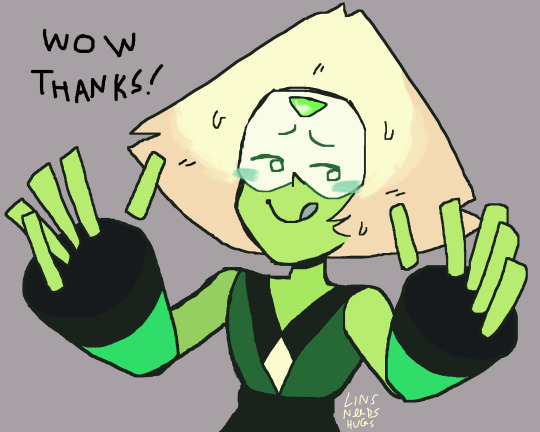
Although the last episodes of SU Future don’t come out til Sunday and April 5 for my region, I want to thank all the folks who worked on this show for giving me immense amounts of inspiration. I’m gonna talk a bit (cough cough understatement) about my experience with Steven Universe these past 7 years so feel free to read or not.
Like everyone in this wonderful community, I will miss SU so much and it will always be a series that will be cherished in my heart for years to come!
It really is over, isn’t it?
This is almost like a recap of when my life started haha. 2013 was an important year for me; like all preteens, I was going through so many changes. I found comfort in watching anime and cartoons. My earliest experiences with Steven Universe was watching the Season 1 episodes and laughing. But Cartoon Network kept replaying episodes and SU became background noise as I played games on the computer and I forgot about the show for a year (thanks Five Nights at Freddy’s 2014 ftw).
Fast forward to March 2015 (around the release of Jail Break but before Full Disclosure) I discovered that Garnet was a fusion the whole time and me, being unware of events since the slice-of-life first half of S1, forgot what a fusion was (ironically, Giant Woman was the episode that replayed the most). Who was Jasper? And who was this Peridot and was she gonna rap?!?! Confused but eager to learn about what I missed, I binged the episodes on YouTube (back when you could watch entire seasons of stuff on there haha). I was caught up and in love with the series again.
Season 2 contained some of my favourite episodes EVER and that was probably because of the gREAT AND LOVABLE PERIDOT! Yes, my blog became Peridot spam. 2016 was the year of Peridot. I loved all her episodes and her arc and I am proud to say my younger brother and I watched “Catch and Release” numerous times in a row until we basically memorized all the lines (I can’t remember anymore but I still love that ep). “YOU CLOD” became a go-to diss. The hiatuses were unbearable but the Stevenbombs made up for them. Oh wait I almost forgot about SARD YARD OH HO HO!
When Lapis came back in Season 3 ... I just fell in love with her. I secretly loved Lapidot a lot because of this vid of Peridot and Lapis singing to “What Is This Feeling?” from Wicked (this leads to more things but I’m focusing on SU ahha). I didn’t tag Lapidot stuff as Lapidot bc of ship discourse but I just fully embraced it at some point. Now, I love that Peridot is aro/ace and I love to think of Lapis and Peridot as platonic besties who goof around haha but will kill you if harm their friends (+Bismuth makes it way more fun). Back to Lapis, I think her Bob persona just got me. Hit the Diamond is another fave episode (I doodled her a lot after this ep). This season was filled with so MUCH... Bismuth, Jasper and some good Beach City folks eps. AND SMOKY QUARTZ AHHH! My favourite fusion design *chef’s kiss* got some development for Amethyst! MWAHHH!
Season 4 was crazy. I remember feeling like ... EHEH.. So Rose wasn’t as great as we thought she was. .. and then Blue Diamond and Yellow Diamond aHHH. And also Pink Diamond WHO?! Is Pink ROSEEE theories.. good times. ARE YOU MY DADDDD?!??? So much speculation about Pink and Rose. I think this season was an okay transition to more plot related episodes.
Season 5 oh gosh the hiatuses. Let’s see.. early/mid 2017, various points in 2018, and finally January 2019... dang. I think while waiting for the next episodes to come, I was busy getting into other series but kept SU somewhere in my head. I feel like I started to draw fanart less as my blog became a site for me to dump all my fandom stuff hehEH 00F. But this season was filled with some great episodes and memorable stuff. Lars big OOF, we learn about what truly happened to Pink, WEDDING TIME (I bought the DVD bc I LOVE), and all that Diamond stuff at the end.. super all over the place but I love it.
And then the movie happened and now HERE WE ARE IN THE FUTURE. (I didn’t talk about songs but know that I love them all haaaaa and even learned a few ukulele chords HAha).
Oh geez, I feel like I just relived some major moments in my life and now I feel woozy ahaa~ Nevertheless, I consider Steven Universe to be one of the important plot points in my life. It really helped me become more knowledgeable in the aspect of LGBT issues and representation and even my own identity. Despite some negative things in the fandom, there were still some positives to it. To all these amazing artists drawing fanart, super cool cosplayers, singers, and other talented folk who are a part of this beautiful fanbase, thank you. And thanks again to the Crewniverse and others who have worked on this show! Now I feel like crying ... and I’m smiling while I type this .. memories.. feels..
*Lapis voice* Okay. Bye.
#steven universe#steven universe future#su#peridot#fanart#doodles#lins doodles#shuddup lins#I AM sOBBINg
25 notes
·
View notes
Photo
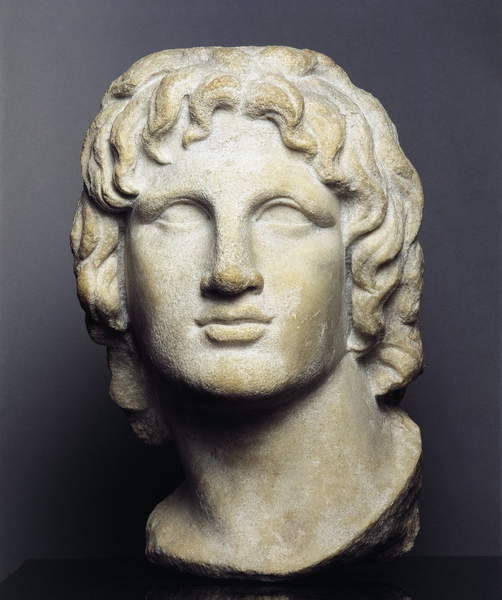
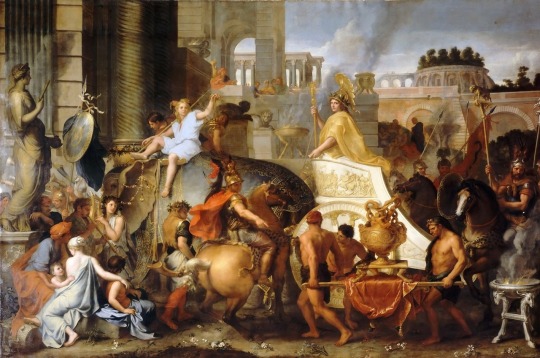
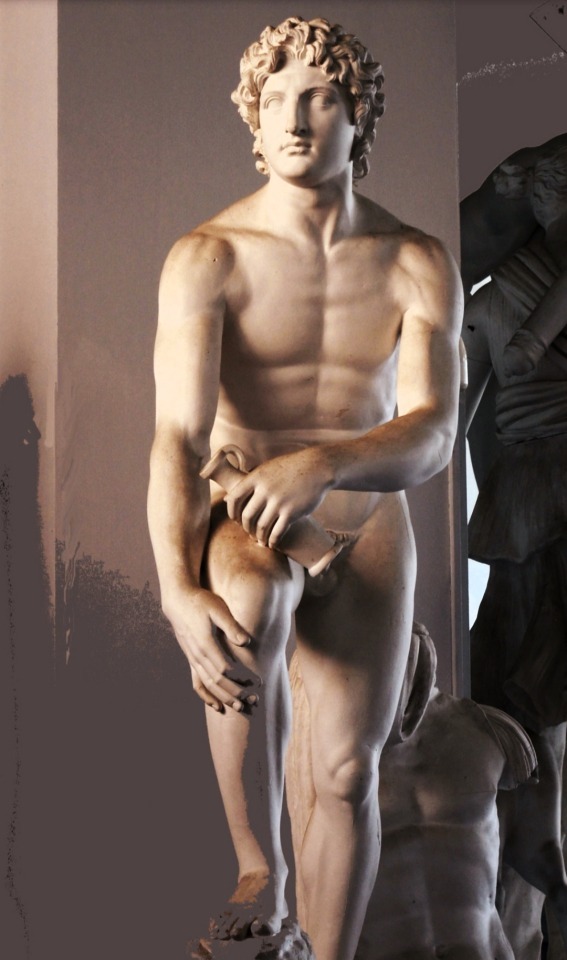
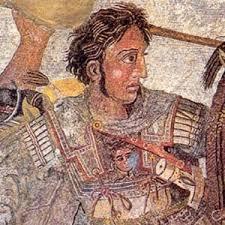
Born in 356 B.C., Alexander the Great is known in history as one of the world’s greatest military minds. Historians also claim he was quite easy on the eyes. Although born as the son of King Philip II and Queen Olympia, Alexander believed that he was instead the son of the Greek God, Zeus, because of his divine ancestry. In his short 13 years as king, Alexander was able to conquer over 2 million square miles of land to establish the largest empire of the Ancient World. His reign stretched from Greece, through the Middle East, to central Asia and India. Spreading Greek culture, language, and thought, Alexander is accredited with influencing the following Hellenistic World with Greek culture.

Tutored academically by Aristotle and in warfare by his father, Alexander the Great was a powerful imperialist. His time with Aristotle ensured for exemplary intellectual abilities; paired with his intense military training, Alexander became an impeccable leader that conquered any land that he desired. Alongside Alexander for most of his reign were Bacephalus, his horse, and friend Hephaestion.
At the age of 16, Alexander was left to rule over the kingdom of Macedonia when his father went to battle with the Byzantine Empire. In this time, Alexander led a cavalry and decimated the Sacred Band of Thebes during the Battle of Chaeronea. This event was the start of Alexander’s military vigor and brilliance. Around two years later in 336 B.C., Alexander’s father was assassinated by his own bodyguard, leaving Alexander the heir to the throne at the age of 20. Alexander was quick to defeat anyone that would keep him from claiming the throne. Following in his father’s footsteps, Alexander continued “world domination.”
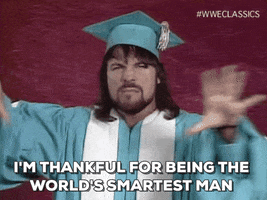
Alexander’s first battle as king began by capturing Persia and destroying the Persian and Greek army. From Persia, Alexander headed south to Sardes and easily took control over the city. He and his army faced resistance in the cities Miletus, Mylasa, and Helicarnassus; Alexander was able to take control over two of the three entirely. Halicarnassus was a little more difficult to conquer as King Darius III amassed a significant army. Alexander and King Darius III met again near Issus in southern Turkey in 333 B.C. where Alexander easily defeated the army. King Darius III fled before Alexander was able to kill him. Alexander’s claim to Persia’s great wealth was established here.
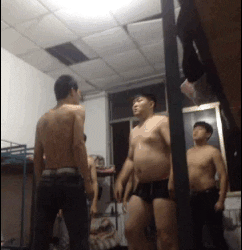
From here, Alexander went to take over Marathus and Aradus, two Phoenician cities. He went to take two other towns, Byblons and Sidon, before attempting to attack the island of Tyre in 332 B.C. The city was surrounded by water, making it difficult for Alexander to have the upper hand as he had no established navy. After a few months of trial and error, Alexander penetrated Tyre, where he executed and sold thousands of civilians for defying his rule.
Hungry for more territory, Alexander set out for Egypt. Like the city of Tyre, Gaza was difficult to capture. Alexander spent several weeks with Gaza under siege before finally claiming victory. After this siege, he entered Egypt and established the city of Alexandria. Of all his conquests, Alexander named 70 cities after himself. After conquering Egypt, Alexander met King Darius III again at Gaugamela in 331 B.C. Defeat came easy, and Alexander was finally able to claim the Persian throne. To gain credibility with the Persians, Alexander adopted Persian customs. His dress was of Persian culture, and he even went as far as practicing proskynesis, a Persian custom where one bowed and kissed the hand of others depending on their rank.
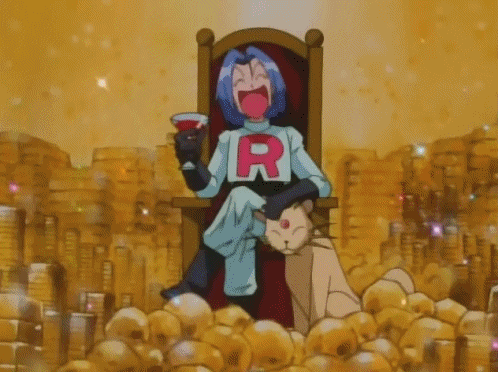
Many Macedonians were not pleased by Alexander’s decision to take on Persian customs and culture. Many of the Macedonian civilians have been thought to have planned Alexander’s death. Due to this, Alexander became increasingly paranoid and began killing any individual that he believed posed a threat to him or his rule. This began first with Parmerio, an esteemed general, and his son; Parmerio’s son was convicted of plotting Alexander’s assassination. Alexander also killed his close friend, Cleitus, after being insulted and his achievements minimized.
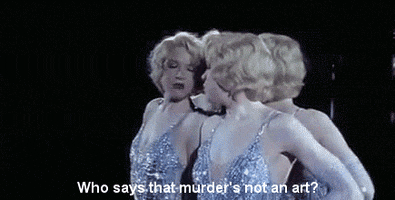
Alexander struggled to capture a region of the Persian Empire, Sogdia, but upon remaining persistant, he eventually was able to claim rule. From here, Alexander moved on to conquer India. Some tribes were easy to overtake while others proved to be more difficult. His beloved horse was killed during an attempt to conquer territory. Devastated, Alexander named the city of Bucephala after his horse. Wishing to conquer all of India, Alexander’s soldiers were weary. Because of this, Alexander retreated back to Persia. With plans to conquer more territory, Alexander died in June of 323 B.C. His death is unknown in cause, although there are some speculations – malaria, infection, and poisoning. Alexander never named a successor. Shortly after his death, his great empire that he had worked so hard to create crumbled.
What’s so great about Alexander the Great? Could it be his desire to name almost every conquered city after himself? Much of the land Alexander conquered retained the Greek influence Alexander introduced. This influence can be found even today in many modern cities. After his death, his legacy influenced the Hellenistic Period, derived from “Hellazein,” which means, “to speak Greek or identify with the Greeks.” Alexander the Great is known as one of the most influential and powerful leaders of the Ancient World.
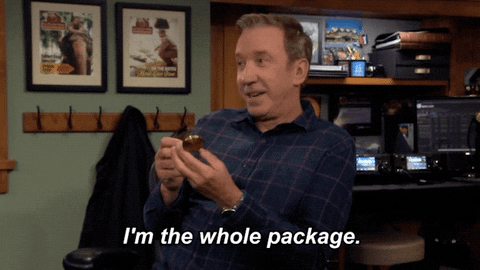
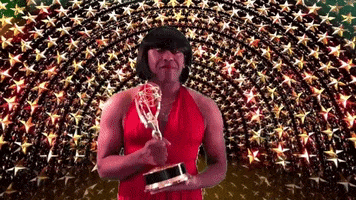
On a different note, I have included gifs that are funny moments that could be used to illustrate Alexander’s thought process. I have also compiled a Twitter of Alexander the Great. I imagine that his tweets would have been eerily similar.
Sources:
(https://www.ancient.eu/article/925/alexander-the-great-as-a-god/)
https://www.history.com/news/alexander-the-great-defeat-persian-empire
https://www.ancient.eu/article/925/alexander-the-great-as-a-god/
Briant, P. Alexander the Great and His Empire. (Princeton University Press, 2012).
Primary sources were taken from some secondary sources (:
2 notes
·
View notes
Text
hi so i have a few ideas i need support + ideas
MOST IMPORTANTLY : here is a poll. muses i want to add that you’d be interested in / willing to interact / plot with.
however i do have some definites i’m going to be doing in terms of ocs. a/leks mar/chant oc, undetermined. ale/c pa/ul oc, undetermined. bre/tt hu/ndley oc, undetermined. lin/dsey washb/urn oc, undetermined, an/ya tayl/or jo/y oc, undetermined. is/rael brous/sard oc, undetermined. m/ary eliz/abeth w/instead oc, undetermined. ale/xz johnson oc, undetermined. so if someone wants to come build connected ocs with any of these faces, hello
#i dont like to add canons unless i Know someone gonna love em#━━ 0 ⋄ ˢʰᵘᵗ ᵗʰᵉ ᶠᵘᶜᵏ ᵘᵖ ᵃᶫᵉˣ ∷ ⌠ psa ⌡ ∷
2 notes
·
View notes
Note
you did this .

aughhhg😭😭😭 cuz now i have to draw her and her stupid ass house,,,,, I have to figure out what their bedroom looks like. i need to figure out what breeds their horses are. sard this is mhmhmhgghhhh bfbfbgbgbvggbg and i need to fricking figure out their age as well and the timeline and how exactly they fit into the plot and haufghhhh,,, still havent decided if she's even human or not.....
sard you have cursed me
LETS FUCKING GO!!!
frolicking into the fields with you hand in hand, self insert thought with self insert thoughts,, oh brother you have to keep me updated in all this,,,,
3 notes
·
View notes